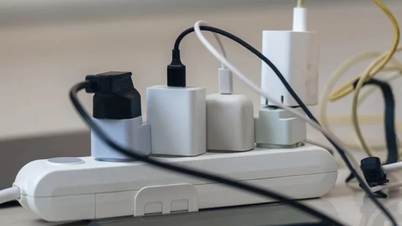
Although the link between microplastics and dementia is not yet clearly established, the findings highlight the importance of reducing exposure to microplastics in daily life, especially in the kitchen environment - Photo: AI
Scientists at the University of Queensland (Australia) have just announced a surprising discovery: just one dishwashing cycle with plastic utensils can release nearly 1 million microplastic and nanoplastic particles, with a total mass enough to accumulate in the human body about 6 milligrams per year.
Notably, these microplastic particles can cross the blood-brain barrier, enter brain tissue and be present in important areas such as the olfactory bulb, which processes odor information and transmits signals to the central nervous system.
"We found that plastic items, including those specifically used in the kitchen, when washed in the dishwasher release large amounts of microplastics into the water. These particles not only stick to other items, but also enter the environment through wastewater and then re-enter the human food chain," said Dr. Elvis Okoffo, lead author of the study.
In the experimental simulation, the research team used 13 common household plastic items such as plates, spoons, cups, food containers, etc. and ran the dishwasher on standard modes. They noted that high temperatures (up to 70°C), combined with cleaning chemicals and mechanical movement, caused the plastic surfaces to wear down, releasing microplastics into the water.
Although microplastics have not been identified as a direct cause of Alzheimer's disease or dementia, recent evidence shows that their presence in the brains of patients is many times higher than that of normal people.
In another study, a team at the University of São Paulo (Brazil) also found microplastics in the olfactory bulbs and nasal mucosa of 8/14 deceased people. This strengthens the hypothesis that breathing polluted air in enclosed spaces such as kitchens may be the main route of plastics entering the brain.
Not only that, microplastics and nanoplastics are extremely small in size (under 5mm and 100 nanometers) and can penetrate biological barriers and enter cells, thereby affecting metabolism and neurological activity. In addition to dementia, studies have also linked microplastics to: cancer, cardiovascular disease, endocrine disorders, and decreased fertility.
In the US, 7.2 million people over the age of 65 are estimated to be living with Alzheimer's disease by 2025. This number is expected to increase to 9 million by 2030, and to 12 million by 2040.
Although the amount of microplastic emitted in each dishwashing session is very small compared to the total source of plastic pollution, experts say it is still a warning sign of the silent impacts of daily activities on long-term health.
How to reduce the impact of microplastics in the kitchen
To protect your health, experts recommend:
Limit the use of plastic in cooking and food storage; prioritize materials such as glass, metal or ceramic.
Avoid heating food in plastic containers, especially in the microwave.
Use air purifiers and good ventilation in the kitchen to reduce airborne microplastic concentrations.
Regularly clean kitchen surfaces and appliances to remove dust containing microplastics.
Reduce consumption of processed foods and foods packaged in plastic.
Source: https://tuoitre.vn/dung-nau-bep-nhieu-co-the-lam-tang-nguy-co-sa-sut-tri-tue-20250527161519638.htm


![[Photo] Prime Minister Pham Minh Chinh attends the event "Digital transformation of the banking industry by 2025"](https://vphoto.vietnam.vn/thumb/1200x675/vietnam/resource/IMAGE/2025/5/29/0e34cc7261d74e26b7f87cadff763eae)


![[Photo] Prime Minister Pham Minh Chinh receives leaders of Excelerate Energy Group](https://vphoto.vietnam.vn/thumb/1200x675/vietnam/resource/IMAGE/2025/5/29/c1fbe073230443d0a5aae0bc264d07fe)


























































































Comment (0)